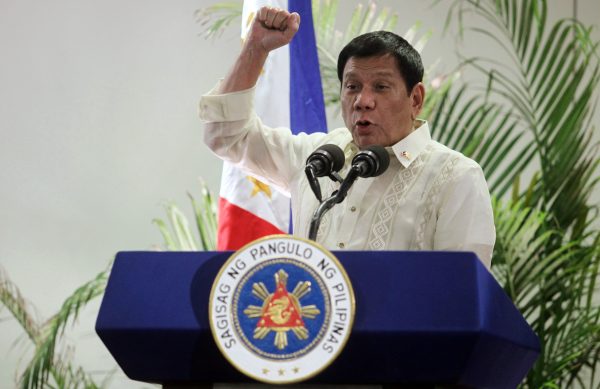But in an unprecedented turn of events, President Rodrigo Duterte has changed tack, challenging the Philippines’ long-standing alliance with the US while engaging and openly accommodating China as its new partner of choice.
This has led many observers to conclude that the Philippines has pivoted towards Beijing at the expense of its time-honoured relations with Washington. But looking beneath the surface suggests that the recent major strategic realignment is a classic domestic–foreign policy issue linkage rooted in US disapproval of Duterte’s anti-drug war that has left thousands dead.
Duterte explained that his antipathy towards Washington started with US criticism of human rights violations under his counter-narcotics campaign, misunderstandings of his insults, and alleged threats to suspend Philippine development assistance. For Duterte, Washington’s unsolicited comments were a form of external intervention in his domestic policy and an affront to Philippine sovereignty. This has magnified demands for an ‘independent foreign policy’ beyond what the Philippine president sees as Manila’s patron-client relationship with the United States.
This independent foreign policy is forming in two ways.
First is the decision to ‘separate‘ or ‘leash-slip‘ from the United States. Duterte has promoted a series of anti-US narratives by reviving historical atrocities of US soldiers in the Philippines and recalling previous infringements of Philippine sovereignty by US service personnel. He seems intent on downscaling bilateral defence ties by cancelling planned joint maritime patrols and suspending war games, such as the Philippine Amphibious Landing Exercise (PHIBLEX). He has also announced that all US troops will be discharged from the Philippines within two years. These actions can be understood as a recalibration of Philippine–US diplomatic interaction and alliance management.
Second is the desire to expand the Philippines’ pool of strategic and economic partners to minimise overdependence on the United States. Related to this is the desire for a soft landing in managing disputes and advancing relations with China.
Duterte believes that Philippine foreign policy has long been subservient to US foreign policy. According to Philippine Foreign Affairs Secretary Perfecto Yasay, the United States has failed the Philippines by using a carrot and stick approach ‘to force Filipinos into submission to American demands and interests’. He adds that what Duterte is attempting to do is to ‘liberate the Philippines’ from its ‘shackling dependency’ and end the ‘nation’s subservience to United States’ interests’.
Unlike human rights criticism from the United States, neither China nor Russia have made statements against Duterte’s counter-narcotics agenda. This indirectly aligns the Philippines with China’s New Security Concept and Asian Security Concept, which both strongly emphasise the fundamental importance of sovereignty, sovereign equality, non-intervention, mutual respect, mutual benefit and practical cooperation.
The Philippines’ distancing from the United States and attempts to diversify partners also coheres with their strategy of appeasement with China. For instance, Duterte has made unilateral concessions on all US-related military activities that China deems provocative. As a result, strengthened bilateral ties and narrowed differences with China are indirectly de-legitimising US military presence and influence in the Philippines. It also negates the moral and strategic imperative to pursue bilateral exercises and joint patrols.
Another incentive for Duterte to go it alone in settling disputes with China is that the Philippines has done all the legwork in challenging China in the South China Sea while other claimant states continue to maximise their own relations with Beijing. While the United States wants the Philippines to press China to abide by the recent arbitral award, it has also been noncommittal over the extent of its defence commitment to the Philippines in the event of a shooting war with China. President Duterte’s actions can thus be seen as a vote of confidence in China’s continued rise and the culmination of his accumulated frustration with the United States.
So what does this mean for Washington?
For US Assistant Secretary of State Daniel Russel, ‘the succession of controversial statements, comments and a real climate of uncertainty about the Philippines’ intentions have created consternation in a number of countries’. This expression of alarm shows how the Philippines can be a swing state in the US-led alliance network, impacting the bilateral alliance and the US regional strategy at large. Bilaterally, the areas most affected would be the political, defence and strategic dimensions of Philippine–US relations, particularly the Philippines’ role in the alliance burden-sharing and bilateral force posturing.
Regionally, Duterte’s stance would affect the dynamism of Washington’s pivotal rebalance to Asia, which aims to increase US diplomatic, political, and military influence in the Asia-Pacific. Moreover, what Duterte has done vis-à-vis the United States may be classified as a form of soft balancing. Washington may be denied access to strategic areas and locations, which may in turn undercut, frustrate, and even raise the cost of action for the United States to project naval and air power. This also reveals diverging approaches and policies towards the South China Sea and China, potentially undercutting the ‘principled security network’ advocated by US Secretary of Defense Ashton Carter.
In forecasting the future political dynamics of Philippine–US relations, much depends on how much the United States presses the Duterte administration on human rights issues, the recalibration of the US’s Asia strategy under the Trump administration, and China’s future activities in the South China Sea.
Aaron Jed Rabena is a Fellow at the Philippine Council for Foreign Relations (PCFR). The views expressed are the author’s own and do not reflect that of his affiliated institution.


In other words, the USA under President Obama’s ‘leading from behind’ doctrine has led President Duterte to conclude that the US is an unreliable and soft ally.
Duterte might be prudent to hold off major alliance re-structuring until he gets clarification regarding President Trump’s foreign policy stance with respect to the Philippines, China and its territorial expansion plans in the South China Sea.
In the mean time, continuing to insult Obama isn’t going to boost Duterte’s credibility or improve his relationship with the US government.